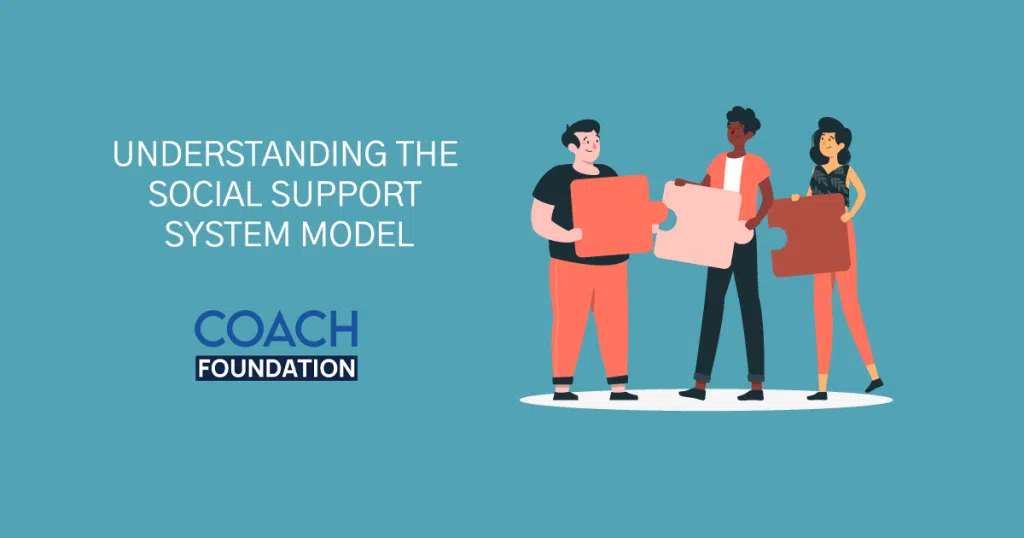Blog » Coaching Models and Techniques » Understanding The Social Support System Model
Understanding The Social Support System Model
The Social Support System Model is a framework that emphasizes the importance of social relationships and support for overall well-being. By understanding and leveraging the strengths and resources of one’s social support network, people can improve their ability to cope with stress, overcome challenges, and achieve their goals.

The Social Support System Model can be applied in a variety of contexts, including healthcare, education, and community development, to promote individual and collective well-being.
In this blog, we’ll explore:
1. What is the social support system model
2. How does the social support system model work
3. Core Concepts of social support system model
4. Application of social support system model to life coaching
So, let’s get started!
What is the Social Support System model
The Social Support System Model is a framework that emphasizes the importance of social relationships and support for overall well-being.
It recognizes that people may have different sources and types of support depending on their needs and circumstances and that the strength and quality of one’s social support network can have significant effects on one’s overall well-being.
The model highlights the importance of social support networks, which refer to the people and resources that an individual can turn to for support. These networks can be diverse and include family, friends, peers, mentors, and community organizations.
The Social Support System Model suggests that social support can have positive effects on overall well-being, including reduced stress, improved physical health, and increased resilience. By leveraging the strengths and resources of one’s social support network, people can improve their ability to cope with stress, overcome challenges, and achieve their goals.
Check out this video to learn more about social support and its characteristics!
How the Social Support System model works
The Social Support System Model recognizes that people may have different sources and types of support depending on their needs and circumstances and that the strength and quality of one’s social support network can have significant effects on one’s overall well-being.
The model highlights the importance of social support networks, which refer to the people and resources that an individual can turn to for support. These networks can be diverse and include family, friends, peers, mentors, and community organizations.
The model can be applied in a variety of contexts, including healthcare, education, and community development. For example, healthcare practitioners may work to identify and support patients’ social support networks to improve health outcomes.
In education, schools may prioritize building positive relationships and support systems among students to promote academic success and well-being. In community development, organizers may seek to build and strengthen social support networks to promote collective resilience and social cohesion.
Sources of social support
Sources of social support can come from a variety of places, including:
Family: Family members can provide emotional support, practical assistance, and advice in times of need. They are often the first line of support for people.
Friends: Friends provide emotional support, companionship, and encouragement. They are an important source of social connection and help people cope with stress.
Coworkers: Coworkers provide practical support, such as help with tasks or advice related to work. They are also a source of emotional support and help people navigate the workplace.
Community groups: Community groups, such as clubs or organizations, provide a sense of belonging and social support. They also offer opportunities for people to engage in activities and pursue interests.
Religious organizations: Religious organizations provide a sense of community, spiritual guidance, and emotional support. They are an important source of comfort and connection for people who share a common faith or belief system.
Learn about sources of social support in this article!
Functions of social support
Social support can serve several functions that contribute to an individual’s well-being, including:
Enhancing self-esteem: Social support provides people with a sense of validation, acceptance, and positive feedback, which can enhance their self-esteem and confidence.
Reducing stress: Social support helps people cope with stressful situations by providing emotional support, practical assistance, and information.
Providing coping strategies: Social support provides people with coping strategies and skills to manage challenging situations.
Facilitating problem-solving: Social support helps people identify and address problems by providing different perspectives and ideas. It can also help people access resources and information that may help solve problems.
Importance of The Social Support System Model
The Social Support System Model is a crucial concept in understanding the role of social support in our lives. Here are some key points to highlight its importance:
Positive effects on mental and physical health: Social support has been linked to better mental health outcomes, including lower rates of depression and anxiety, and improved physical health outcomes, including better immune function and overall health.
Negative effects of a lack of social support: A lack of social support has been associated with negative health outcomes, including increased stress, poorer mental and physical health, and higher mortality rates.
Role of social support in recovery from illness or trauma: Social support can be a key factor in recovery from illness or trauma by providing emotional, practical, and informational support, and helping people overcome challenges and build resilience.
This article provides a comprehensive summary of the value of social networks.
Applying Social Support System Model to Life Coaching
The Social Support System Model can be a useful framework for life coaching, as it emphasizes the importance of social support in achieving personal goals and improving overall well-being. Here are some ways in which the model can be applied:
Identifying sources of social support: Life coaches can work with clients to identify their existing sources of social support, such as family, friends, colleagues, and community groups, and help them strengthen these relationships.
Developing strategies for enhancing social support: Life coaches can help clients develop strategies for enhancing their social support networks, such as by improving communication with loved ones, joining social groups or clubs, or volunteering in the community.
Addressing social support gaps: If clients are lacking in social support, life coaches can work with them to identify potential sources of support, such as through online communities or support groups, and help them build new relationships.
Encouraging self-support: Life coaches can also encourage clients to cultivate self-support, such as by engaging in self-care activities or developing positive self-talk, as a complement to their social support networks.
Conclusion
The social support system model posits that people benefit from having access to a network of supportive relationships. The availability of social support can provide people with a sense of belonging, enhance their self-esteem, and provide resources for coping with stressors.
The effectiveness of social support may vary depending on factors such as the quality of relationships, cultural context, and individual differences. Overall, the social support system model underscores the importance of maintaining and strengthening social connections as a means of promoting well-being.
I look forward to reading your thoughts on this blog. Feel free to add your own thoughts and observations below.
Frequently Asked Questions (FAQs)
1. What is the concept of the Social Support System model?
The Social Support System model posits that social support can come from various sources, such as family, friends, colleagues, and community groups, and can provide a range of functions, including emotional, informational, and tangible support. The model highlights the dynamic nature of social support and the need to foster and maintain social relationships to promote well-being.
2. What are a few examples of the Social Support System model?
Here are three examples of the Social Support System model:
1. After a traumatic event, such as a natural disaster or a serious accident, people who have access to a strong social support network may have better-coping mechanisms and be more resilient in their recovery than those who do not have such support.
2. A person who is dealing with a chronic illness, such as cancer or diabetes, may benefit from emotional and tangible support from family members, friends, and healthcare professionals to help manage their condition and improve their overall quality of life.
3. Employees who experience support from their coworkers and managers are more likely to have higher job satisfaction, lower stress levels, and improved performance, which results in a positive work environment and increased productivity.
3. What are the pros and cons of the Social Support System model
Here are some potential pros and cons of the Social Support System model:
Pros:
1. Emphasizes the importance of social connections and support in promoting mental and physical health
2. Provides a framework for understanding the various sources and functions of social support
3. Encourages people to seek out and maintain social relationships to improve their overall well-being
4. Can be applied in various contexts, including healthcare, workplace, and community settings
Cons:
1. May not fully capture the complexity of social support networks and their effects on people
2. May overlook individual differences in the ways people seek and respond to social support
3. May not account for the potential negative effects of social relationships or support, such as social pressure or conflict
4. May place too much emphasis on the role of social support, potentially overshadowing other factors that influence health and well-being.

ABOUT SAI BLACKBYRN
I’m Sai Blackbyrn, better known as “The Coach’s Mentor.” I help Coaches like you establish their business online. My system is simple: close more clients at higher fees. You can take advantage of technology, and use it as a catalyst to grow your coaching business in a matter of weeks; not months, not years. It’s easier than you think.
AS SEEN ON





